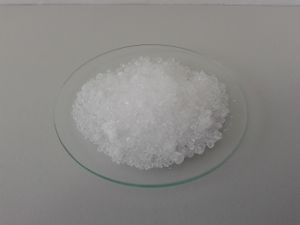Cadmium acetate
 Cadmium acetate dihydrate sample
| |
| Names | |
|---|---|
| IUPAC name
Cadmium acetate
| |
| Other names
Acetic acid, cadmium salt
Bis(acetoxy)cadmium Cadmium(II) acetate Cadmium diacetate Cadmium ethanoate | |
| Properties | |
| Cd(CH3COO)2 (anhydrous) Cd(CH3COO)2·2H2O (dihydrate) | |
| Molar mass | 230.500 g/mol (anhydrous) 266.529 g/mol (dihydrate) |
| Appearance | Colorless white crystalline solid |
| Odor | Vinegar-like |
| Density | 2.341 g/cm3 (anhydrous) 2.01 g/cm3 (dihydrate) |
| Melting point | 255 °C (491 °F; 528 K) (anhydrous); 130 °C (dihydrate) (decomposes) |
| Soluble | |
| Solubility | Soluble in ethanol, methanol Insoluble in toluene, xylene |
| Hazards | |
| Safety data sheet | Sigma-Aldrich |
| Related compounds | |
| Related compounds
|
Zinc acetate |
| Except where otherwise noted, data are given for materials in their standard state (at 25 °C [77 °F], 100 kPa). | |
| Infobox references | |
Cadmium acetate is a chemical compound with the formula Cd(CH3COO)2. This colorless solid is classified as coordination polymer, featuring acetate ligands interconnecting cadmium centers. Cadmium acetate exists in anhydrous form and as dihydrate, Cd(CH3COO)2·2H2O.
Contents
[hide]Properties
Chemical
Thermal decomposition of cadmium acetate gives cadmium oxide.
Physical
Cadmium acetate is a colorless crystalline solid, with a slight vinegar-like smell. It is soluble in water and primary alcohols.
Availability
Cadmium acetate is sold by chemical suppliers. It can sometimes be found on eBay.
Cadmium acetate is Group 1 carcinogens by the IARC, making it difficult to acquire in many countries.
Preparation
Cadmium acetate can be obtained by treating cadmium oxide with acetic acid:
- CdO + 2 CH3COOH → Cd(CH3COO)2 + H2O
Concentrating the solution and cooling it will cause crystals to form.
Projects
Handling
Safety
Cadmium acetate is extremely toxic and is classified as Group 1 carcinogen. Wear proper protection when handling it.
Storage
Cadmium acetate should be stored in closed bottles, in well ventilated places.
Disposal
Should be converted to an insoluble cadmium compound, such as cadmium sulfide and taken to hazardous waste disposal centers.
References
- Jump up ↑ http://www.electrochemsci.org/papers/vol7/7076059.pdf
- Jump up ↑ http://www.ijnd.ir/article_6189_773.html